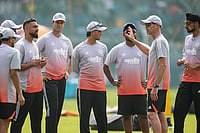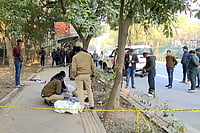Dilip Mazumdar, still sprightly at 65, strides briskly into his squeaky clean chamber after a hectic day. Since the morning, the chairman of West Bengal Industrial Infrastructural Development Corporation (WBIIDC) has had two meetings with business delegations, visited one of the growth centres, and was back to keep his evening appointment with the media. But people who know him will tell you he's not your typical manager. In fact, Mazumdar is among a rare breed who's crossed over from the opposite side—former trade union activists who are now running some of the premier state-owned units in West Bengal.
And he is not alone. There's Rajdeo Goala, chairman, Calcutta Tramways Corporation (CTC), Benoyendra Chakravarty, chairman, West Bengal Small Industries Development Corporation (WBSDIC), and Braja Mukherjee, who heads the West Bengal Khadi Board. Obviously, the Left Front government here feels that such appointments will ensure higher productivity and improved labour relations in state units. Some even believe that it is a way to reward people who have aged or become redundant politically. That may explain why all the four were leaders of the CPI(M)-affiliated CITU.
In some cases, the unionist-CEO may even smoothen the process of inevitable closure of some state units. For instance, when Goala took over the ailing CTC a few weeks ago, opposing unions like INTUC wrote to the chief minister alleging this was a government ploy to liquidate the corporation. In fact, the appointment of a former unionist as CEO could be taken as a move to reduce the chances of a workers' backlash. After all, Goala had been the head of CTC's majority union for years, and understood the workings of the company. So, he would be the right man to do the politically-sensitive job.
However, Goala says his task is to work out a "concrete development plan" for CTC. "I'll discuss certain proposals with the transport minister. If necessary, we have to get funds and help from international agencies to save CTC," he says. Of CTC's 220 tram cars, only 80 operate daily (Goala, however, maintains that 180 trams can run every day). On top of that, the CEO has to deal with his former union's demand to regularise 1,500 casual workers. Clearly, Goala has to tread warily through a minefield. "What is clear is that CTC can't survive in its present shape," says a senior official.
And therein lies the catch. Unlike other appointees, these former unionists can take hard decisions either way—whether to close down firms or to make them more viable. Take the case of WBSIDC's Chakravarty. The first thing he did after taking over was to clear out scores of so-called entrepreneurs—who had taken up sheds but did little work—from 26 industrial estates. He just asked them to shut shop and vacate. "I felt if they couldn't get their act together even after months, something was clearly wrong. We freed 70,000 sq feet of space in Baltikuri estate, 19,000 at Behala, and another 11,000 at three other estates," explains Chakravarty.
More than that, the CEO has cut operating expenses from around Rs 60 lakh a month to Rs 35-40 lakh. Staff has been scaled down and WBSIDC doesn't receive any subsidies (around Rs 3-4 crore annually earlier) from the state budget. "I find it is possible to do away with subsidy if you watch your expenses and spend wisely," says Chakravarty, his pitch totally contrasting with the usual subsidy-seeking leftists and unionists. What's obviously surprising is that all this has been achieved without any opposition from the employees!
Similar evidence is available at WBIIDC. The organisation, which runs 12 "mega growth centres" in West Bengal, has been known to allot land to entrepreneurs within 24 hours after an application is filed."We seek to make sure people put up units in districts which had no industry earlier. Take Cooch Behar and Malda districts. Did you know of any industry operating in these districts? Well, at present there are 55 units located in our centres at Cooch Behar and 62 in Malda," explains WBIIDC's Mazumdar. And these include known companies such as Hindustan Lever, ONGC and Larsen & Toubro.
Today, WBIIDC's problem is trying to acquire land that can be alloted to potential investors. For example, in Malda, it thought that a 50-acre centre would be enough. But now it's thinking of a massive expansion, getting a 350-acre centre there. Mazumdar's ability to deal with the workers effectively helped WBIIDC to grow faster. His motto: "One should never reject a worker's suggestion regarding improvements without checking it out. Usually it pays off, and makes the average worker feel proud." In Malda, at least, it seems to have worked.
But the West Bengal experiment has its share of critics, especially among the opposition unions. "Union leaders cannot run industrial units or companies. Also, please note that most of the appointees like Mazumdar and Chakravarty hail from Burdwan district and report to the industry minister, Nirupam Sen, who too is from Burdwan," says a senior INTUC leader. Even younger, upcoming INTUC leaders like Ramen Pandey feel this will not help improve the condition of workers in West Bengal. "I don't think today's Left leaders even keep themselves abreast of the latest labour trends," says Pandey.
No wonder then, there are severe doubts over the West Bengal government's initiative to have former trade union leaders as CEOs. Others point out that the state's decision may actually be a makeshift arrangement to run sick units and reduce workers' opposition. Since these are political appointees who have access to key decision makers, they can provide the much-needed breathing space for the serried ranks of workers they command. And simultaneously manage the electoral fallout since labour is a major supporter of the ruling party.
The Working Drones
Ex-unionists head state units. But can they pull up labour, push up productivity?

The Working Drones
The Working Drones
Published At:
MOST POPULAR
WATCH
MORE FROM THE AUTHOR
PHOTOS
×

















